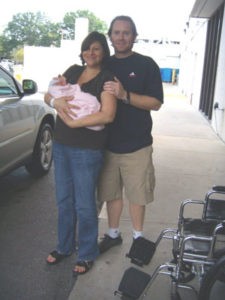This article was originally published on InterfaithFamily.com. It has been republished here with permission. Around eight years ago my husband and I began planning for our first child. She wasn’t even conceived yet, but we knew we wanted to be prepared and healthy for pregnancy. Together, we went to my ob/gyn and discussed prenatal vitamins, healthy eating and genetic screening.
I didn’t blink an eye about the screening. It was common amongst women I knew to make sure there were no genetic abnormalities that could affect our child.
I was shocked when I got the results that I was positive as a carrier for Tay Sachs. Tay Sachs is a disease most commonly found in Ashkenazi Jews (Jews who come from Central and Eastern Europe like myself), but no one in my family is a known carrier for Tay Sachs and we haven’t had any babies afflicted.
Being a carrier means I have a chance of passing the gene on to my child, but she could only have the actual disease if my husband was also a Tay Sachs carrier. Since my husband is not Jewish and Tay Sachs is typically thought of as a Jewish disease, I wasn’t really worried. But to be completely safe we decided to go ahead and have him tested anyway. We were relieved when he tested negative.
Fast forward around six months and I’m three months pregnant with our first child. All is going well when I go to a specialist for a routine sonogram. The doctor looked at our chart and tells my husband he had the wrong screening. Apparently there is a different test for those who aren’t Jewish. The doctor recommended that he get the test, which we did, but still we weren’t very concerned.
And that’s when our world flipped upside down.
I got the call from the doctor one afternoon at work. You know the news isn’t good when the actual doctor calls instead of the nurse. My husband tested positive as a carrier for Tay Sachs and our baby, the baby I had been carrying for three months, the little girl who was starting to make her presence known in movement and in size, could be afflicted with the disease.
The doctor had already scheduled a genetic counselor to meet us in his office, that afternoon. He had already scheduled an amniocentesis for the next day. No one was moving slow on this.
The genetic counselor explained that it’s not that unusual for interfaith couples to both be carriers. Those of Irish origins, like my husband, actually have a rate of Tay Sachs that is almost as high as those of the Ashkenazi Jews.
She explained everything to us, but I’m not sure how much of it I processed. The next day we went in for an amnio and I closed my eyes so I didn’t have to see the huge needle pressing into my belly nor the image of our daughter who may or may not be healthy.
Getting in to see the genetic counselor and getting the amnio was quick, but the wait for the results was long and arduous. We waited for weeks while they flew the amniotic fluid to a hospital in New York that specializes in Tay Sachs, analyzed our DNA, found my husband’s mutation and then searched for it on my daughter’s DNA.
Finally, on our fourth wedding anniversary while sitting in Lowe’s picking out bathtubs for a home renovation we were also undergoing, my husband and I got the news that our daughter was healthy.
Suddenly life moved forward again as it does, especially as expecting—and finally, new—parents.
We named our daughter Mirabelle because we thought it was a beautiful name that sounded like miracle, which to us, she is. Today, she is six-years-old and fun and feisty and the best thing that ever happened to us.
There are a lot of people out there who wonder why even have genetic tests? They figure they’ll deal with what they are given. But, here’s the thing. Knowing what to expect gives you options, and time to prepare for whatever it is you are dealing with.
For us, having another child is risky, but eventually we wanted to expand our family. We met with the genetic counselor again and learned our options. We could take the chance of naturally conceiving a healthy child, choose not to have any more children, use donor sperm or eggs, or go through In Vitro Fertilization (IVF) and PGD testing, which allows doctors to test our fertilized embryo for Tay Sachs.
We opted for IVF and PGD testing. This option is expensive and physically and emotionally taxing but felt like the right choice. Unfortunately for us it didn’t work, and we have come to terms with having a smaller family than we originally planned. But for others in similar situations who want to grow their families and have some control over the health of the child, this is an extremely viable option.
I wouldn’t wish a situation like we went through on anyone. It was the hardest thing I’ve ever gone through and still affects me today. Every year on our anniversary I think back to that moment when we got the call telling us our baby was healthy. And every time I see families with more than one child, or have to answer questions from my daughter about why she doesn’t have a little brother or sister, I imagine what life would be like if gone as planned. But that’s life right? And I wouldn’t change anything because I have the most wonderful daughter and husband I could ever ask for.
If you or anyone you know is going through something similar or planning a pregnancy, I urge you to know your options. The National Tay-Sachs and Allied Diseases Association highly recommends a combination of DNA and biochemical (enzyme) carrier screening for the most sensitive and accurate carrier detection. Not all saliva tests are created equally and—especially for individuals that are not Jewish—blood enzyme testing is currently the gold standard.
There are a number of testing centers that offer comprehensive carrier screening programs for the Jewish community. The Center for Jewish Genetics offers comprehensive subsidized carrier screening in Illinois for over 80+ conditions including the 19 diseases common in the Ashkenazi community. The Victor Center offers subsidized carrier screening in multiple states. The Jewish Genetic Diseases Center of Greater Phoenix offers both educational and carrier screening programs in the Phoenix area. And lastly, the Program for Jewish Genetic Health at Yeshiva University in NY helps individuals schedule genetic counseling appointments to complete the appropriate genetic testing.
You can also visit JScreen.org to learn about a new at-home saliva-based genetic screening program. JScreen lets people screen for 19 Jewish genetic diseases, as well as many other diseases common in the general population. You can even do the screening from your own home. (It is important to note that Tay-Sachs enzyme analysis is not included in this screening. Please ensure that you speak with your physician to have that portion of the testing completed.) Or, contact your physician or a local genetic counselor about other screening options in your community. Life may not always go as planned, but in my opinion you can never be too careful or too prepared when it comes to the health of your family.
Elizabeth Freid Vocke is married with one daughter and one rescue dog, Chloe. She is a full-time mother, writer and founder/chief strategist of marketing communications firm, Evoke Strategy, which she runs with her husband. Elizabeth enjoys reading, writing, playing tennis and most of all, setting all that aside to spend time with her family. She can be reached at [email protected].



